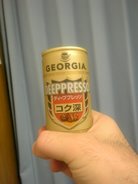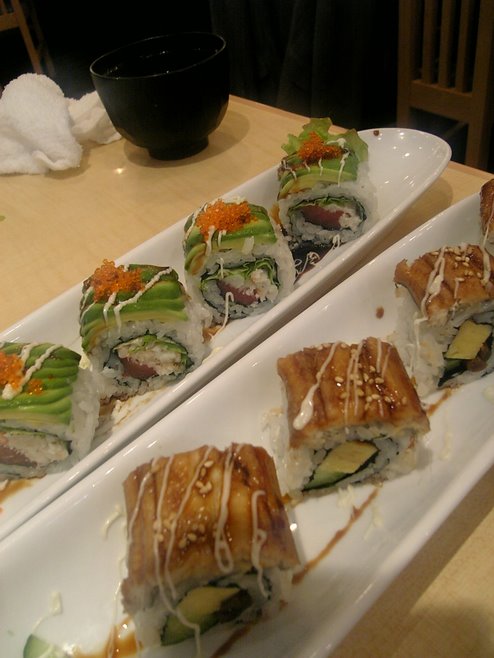it's interesting what you can tell about a culture by looking at its language.
in english, for example, we are very interested in discussion. it's an often confrontational language, and it's one in which people like to ask a lot of questions.
japanese, on the other hand, seems to be a rather agreeable language-one in which people strive to find consensus, rather than conflict. in other words, it's not a culture that promotes the asking of a lot of questions.
this is evident in things like greetings.
in japanese, friendly greetings don't involve questions, but rather statements. "good day" or "good evening", for example.
in english, on the other hand, friends are greeted with a casual question:
-how are you?
-what's up?
-what's new?
or as my manager has taken to greeting me after a particularly ill thought out impromptu lesson (courtesy of my new coworker).
-how's it hanging?
this would normally be no problem, as that phrase has lost most of its original filthy connotation, but then she breaks out into her expected answer:
"long and strong?"
or sometimes "off to the left?"
i don't know what will happen with TWO dirty teachers at the school... but i'm getting a pretty good idea.
this brings me to the most interesting area of language/culture interaction-at least as i see it.
swearing / cursing.
the things that a culture uses for expletives are always very interesting to me. they show a lot about the things that a culture is uncomfortable with.
french canadians reference religion with their cursing. "tabernaque" is about the worst word- its a reference to the place where the eucharist is stored in church: in english, it's called a "tabernacle". (for anyone unfamiliar, the eucharist or "host" is that little white circle of bread that christians eat at church).
from what i've learned of japanese, the worst insult translates as "fool". literal stuff (eg "you're just using me for sex" is usable, but only with an explanation.
incidentally, a good friend asked how to say "cockpunch" in japanese. the answer is "ちんちんパンチ" or (chin chin panchi)... but thats literally "penis punch" (or so i was told).
anyway, i really feel that english swearing is far fouler in imagery, and therefore way more effective than any language i know of... though i suspect that russian and german have their strong suits. i would say that maybe i feel this way because its my native language, but this idea has been seconded by some non native speakers.
----
When I'd originally written this post, I'd gone ahead and given some examples of very foul swearing, both in English and in Japanese. On reading it later, however, realized that I can be a very, very dirty person. I know, I know... I'm shocked too. Anyway, I felt that it would be better NOT to post some of the things I came up with while turning my brain over trying to be as dirty as I possibly could. If you've ever hung out with me personally, then you can use your imagination. If you are interested in the original foulness, then by all means, email me and I will forward a collection of terrible phrases and idioms to you. Otherwise, use your imagination.
In lieu of this filthiness, I wanted to point out that English swear-words often cluster around body functions. A great many of them reference sexual acts or various other body-related things. If we stick to my idea that swear-words come from things that a culture is uncomfortable with.... then perhaps the puritan tradition is alive and well in ways that no one ever expected. Just think, the next time you drop an F bomb, you can thank the puritans for helping you express yourself!
Incidentally, everything before the "-----" break in this post was written on my cell phone. (thus, the lack of capital letters)
skip to main |
skip to sidebar




the best way to end the day

It's like culture shock, but in reverse.
Adventure = Good

- Merry Man
- Tokyo, Japan
- Culture shock is what happens when you live in a foreign country, and you often become irritated or frustrated by all of the cultural differences. Culture Shock makes people bitter, angry and frustrated. It makes people hate all the little things that make a nation like Japan unique, and it has the potential to put a real damper on your ex-patriot life. One way to fight Culture Shock is to be hellbent on being more shocking than any given cultural situation. I have a dirty mind, a sick sense of humour and I firmly believe in eating very strange things to assert my rightful place on the food chain. Welcome to my little window on Japansanity.
Randomness = Good

Labels
- japan (36)
- engrish (32)
- funny (32)
- culture (28)
- pictures (27)
- food (20)
- foreigners (20)
- weird (16)
- japanese english (15)
- engrish-ish (14)
- fucked up shit (11)
- japanese (11)
- Traditions (10)
- travel (10)
- wonderful (10)
- english (8)
- Tokyo (7)
- amusement (7)
- irony (7)
- let's advertising (7)
- penis (7)
- tourism (7)
- twisted (7)
- I'm really sorry (6)
- culture shock (6)
- japanese "girls" (6)
- kyoto (6)
- restaurants (6)
- drinking (5)
- fuji (5)
- girls (5)
- japanese culture (5)
- japanese girls (5)
- korea (5)
- trains (5)
- yuck (5)
- Festivals (4)
- Summer (4)
- bleech (4)
- dress up (4)
- emo (4)
- fuji pictures (4)
- history (4)
- izakayas (4)
- janglish (4)
- odakyu line (4)
- parties (4)
- playboy (4)
- shibuya (4)
- sport humping (4)
- stupid (4)
- sushi (4)
- teaser (4)
- adventure (3)
- anal (3)
- art (3)
- birthday parties (3)
- cops (3)
- friends (3)
- fujikyu (3)
- karaoke (3)
- movies (3)
- products (3)
- signs (3)
- silly (3)
- television (3)
- tentacles (3)
- translation (3)
- unfunny (3)
- vacation (3)
- women (3)
- Action Movie Stars (2)
- Australia (2)
- Canada (2)
- about procrastinating (2)
- boobies (2)
- business people (2)
- cock rock (2)
- eew (2)
- enlightenment (2)
- fancy dress (2)
- farting (2)
- geisha (2)
- geishas (2)
- good (2)
- hostess (2)
- illegal (2)
- kanji (2)
- maids (2)
- nature (2)
- ninjas (2)
- places (2)
- preview (2)
- rock gardens (2)
- safety (2)
- samurai (2)
- shinjuku (2)
- sick (2)
- strange (2)
- temples (2)
- websites (2)
- wigs (2)
- xenophobia (2)
- xenophobiaish (2)
- zoos (2)
- Antique Junk (1)
- BBQ (1)
- Disco (1)
- Fireworks (1)
- Hokusai (1)
- Ryoanji (1)
- Science Museum (1)
- TMNT (1)
- Thumb War (1)
- UFO catcher prizes (1)
- Yatta (1)
- airbags (1)
- all nighter (1)
- all your base are belong to us (1)
- animals (1)
- anime (1)
- atami (1)
- babies (1)
- baseball (1)
- bicycling (1)
- bling (1)
- buddha (1)
- cats (1)
- censorship (1)
- cheat (1)
- cheating (1)
- children (1)
- china (1)
- chinatown (1)
- choclate (1)
- christmas (1)
- coffee (1)
- cola (1)
- costumes (1)
- crazy (1)
- daikanyama (1)
- dance (1)
- dancing (1)
- death (1)
- dog hotel (1)
- drag queens (1)
- edo era (1)
- ego (1)
- fear (1)
- films (1)
- fish (1)
- garbage (1)
- gay/okama (1)
- gestures (1)
- goodbye (1)
- grammar (1)
- halloween (1)
- handfantasy (1)
- harmony (1)
- haunted houses (1)
- hickies (1)
- holidays (1)
- horror (1)
- hostess club (1)
- kinkaku-ji (1)
- kinkakuji (1)
- lawbreaking (1)
- lesbians (1)
- let's (1)
- links (1)
- lizard (1)
- love (1)
- mamacherry (1)
- midori sushi (1)
- monks (1)
- nambanjin (1)
- noborito (1)
- okama (1)
- onsen (1)
- pets (1)
- philosophy (1)
- photobucket (1)
- post (1)
- pub (1)
- pyjammas (1)
- relationships (1)
- rides (1)
- roller coasters (1)
- roppongi (1)
- ryokans (1)
- sakuragicho (1)
- sakuraguicho (1)
- santa claus (1)
- sashimi (1)
- scorpion (1)
- sento (1)
- sex (1)
- shinkansen (1)
- shrine (1)
- shrines (1)
- sleeping people (1)
- snack (1)
- squid-on-a-stick (1)
- star wars (1)
- students (1)
- sunkus (1)
- sunrise (1)
- survey (1)
- suzume (1)
- teaching (1)
- the (1)
- theme parks (1)
- throbbing (1)
- todai-ji (1)
- todaiji (1)
- toilets (1)
- transit (1)
- video (1)
- wa (1)
- water (1)
- winter (1)
- work (1)
- writing (1)
- yasukuni (1)
- yum (1)
- zen (1)
- zero wing (1)
- 竜安寺 (1)
Glorious Deepresso

Oldnanigans
-
▼
2006
(142)
-
▼
August
(18)
- Stereotypes
- Acting your age: optional
- Police: Scary, but only in person
- Virtual Intelligence
- rebooked
- moblogging: hipster without a choice
- Fireworks: a tangental narrative, with Video!
- Sweet Japan Pics #9: What time is it?
- Sweet Japan Pics #8: WHAT THE FLYING !"#$&%?!?
- Booked
- Shoehorny
- Proof that in Japan, a face can be put on ANYTHING
- The Best Sushi EVAR
- Language/Culture/Expleditives
- Sweet Japan Pics #7: My Favourite Train Station
- Baka Gaijin
- Depresso'd? F U !
- Sweet Japan Pics # 6: Most Poorly Named Coffee EVAR
-
▼
August
(18)
E-people
- David's Show Tunes & Electrocoustica
- Ed the Cat - a more ... mature perspective on Japan
- Felicity's Felicity
- Heather, Happiness and Candida
- Japan Probe - funny news, culture and whatnot from J-land
- Metropolis - a Tokyo English Mag
- Raf: Angry and Polish. Huzzah!
- Tokyonodoko: what to do and where to do it
Japanese Food

the best way to end the day
Merry Man


1 comment:
Juggling Dave asked me the other day what "tabarnacle" meant when used as a curse word.
I guess it's like asking the definition of "fuck", but nowhere near as fun to explain.
tabernacle (TA-BAY-NAK) is just a n exclaimation, much like "Dammit!" or "Frig!" It's not directed at anyone, or used to intensify other words, at least as far as I know.
Post a Comment